Business & Politics
South Korea’s Acting President Han impeached; Stocks, won plummet
The first acting president impeachment in Korea will likely batter the already weak economy – Asia’s fourth-largest
By Dec 27, 2024 (Gmt+09:00)
4
Min read
Most Read
LG Chem to sell water filter business to Glenwood PE for $692 million


Kyobo Life poised to buy Japan’s SBI Group-owned savings bank


KT&G eyes overseas M&A after rejecting activist fund's offer


StockX in merger talks with Naver’s online reseller Kream


Mirae Asset to be named Korea Post’s core real estate fund operator


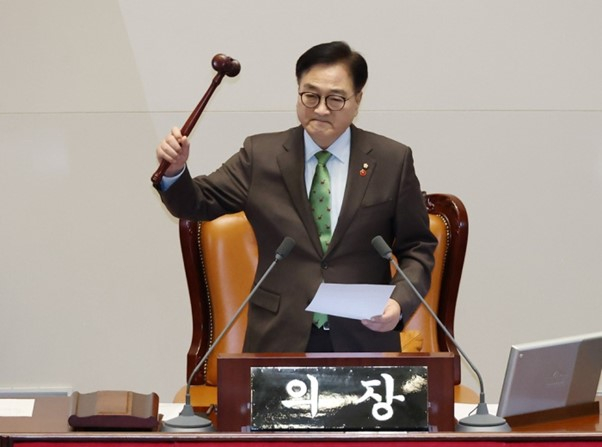
Han Duck-soo, South Korea’s acting president and prime minister, was impeached in Parliament on Friday amid a deepening political crisis battering the already weak economy, Asia’s fourth-largest.
This marks the first time in the nation’s history that an acting president has been impeached.
With his job suspended, Choi Sang-mok, the finance minister and deputy prime minister, is next in line to be acting president.
Even before the opposition-controlled National Assembly began voting for the impeachment in the afternoon, Korean stocks fell sharply and the won retreated to its lowest level against the dollar in nearly 16 years.
Lawmakers from the main opposition Democratic Party (DP) and smaller opposition parties unanimously passed the impeachment motion in a 192-0 vote, creating a power vacuum in the country.
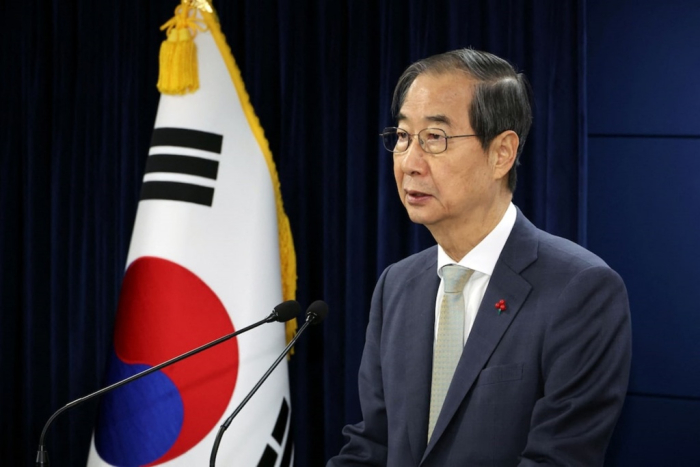
Han was made acting president earlier this month, after the National Assembly impeached and suspended President Yoon Suk Yeol on Dec. 14 for his martial law declaration on Dec. 3, which was reversed by the Parliament only six hours later.
Han’s impeachment came after he refused on Thursday to appoint three judges to fill vacancies in the Constitutional Court, the body that began a process later Friday to decide whether to remove or reinstate Yoon. The process would take up to six months.
The opposition has pushed for Han to sign off on three nominees to fill the bench in the nation’s highest court.
However, Han said in a televised address on Thursday that he would hold off on appointing the nominees until the rival parties – Yoon’s governing People Power Party and the opposition bloc agree on whether he has the authority to do so as the acting president.
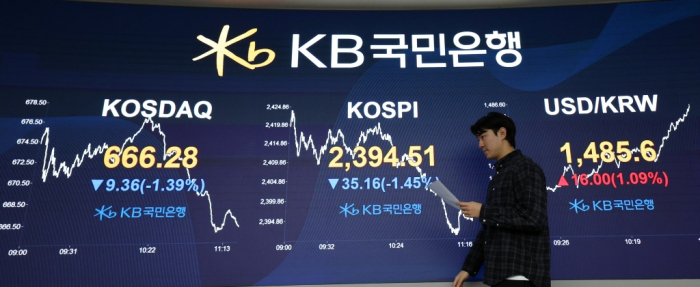
The opposition has accused Han of aiding Yoon in his brief declaration of martial law by not opposing him at the time and by “impeding” the appointments of three justices.
RIVAL PARTIES FACE OFF
At the heart of the matter is how the court might rule on Yoon’s impeachment. Six or more justices out of the nine-member court must vote in favor of impeachment to remove him from office.
The top court currently has only six justices, meaning that the impeachment could be overturned with just one dissenting voice in Yoon’s trial.
As for Acting President Han’s ousting, the rival parties have also disagreed on how many votes would be needed for him to be impeached.
The ruling party maintained that a two-thirds threshold must be met since Han is the acting president. The opposition asserted that a simple majority of 151 votes would be enough to remove him from his office as prime minister as outlined by the Constitution.
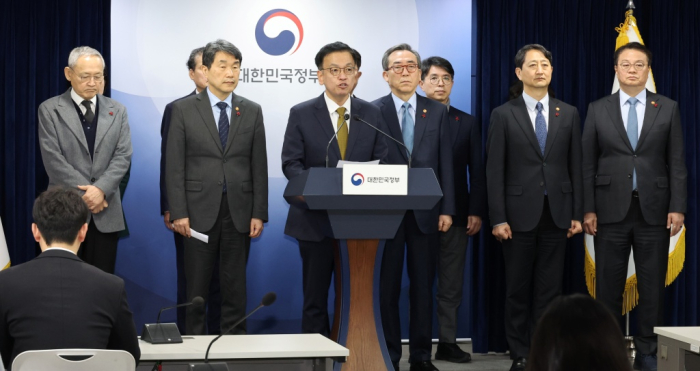
KOREAN ECONOMY TORMENTED
The political turmoil has spilled over into financial markets, pushing business and consumer confidence lower and causing the Korean currency to plunge.
On Thursday, the won – already the weakest currency in Asia this year – tumbled to levels against the greenback not seen since the 2009 global financial crisis.
The local currency fell further to close at 1,467.5 per dollar in Seoul on Friday, as analysts said there was little to reverse the tide of negative sentiment stemming from the political uncertainty.
The stock market’s benchmark Kospi index fell 1.5% on Thursday and declined more than 1% to close at 2,404.77 on Friday – a sharp contrast to many major indexes, in Asia and elsewhere, that have posted double-digit gains.
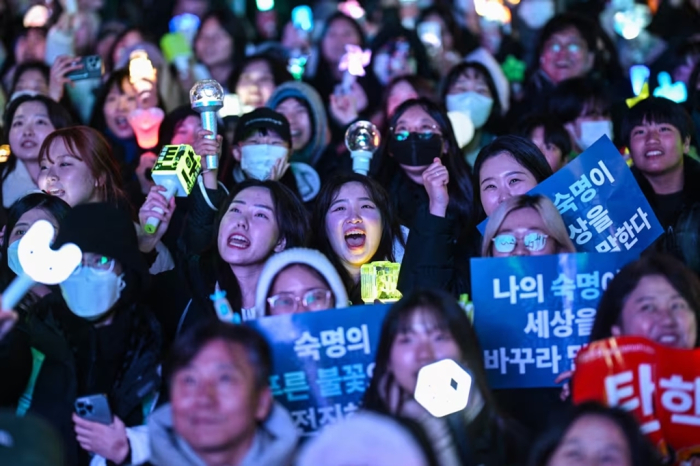
Earlier on Friday, Finance Minister Choi warned that impeaching the acting president would seriously damage the country's economic credibility.
“The economy and the people's livelihoods are on thin ice under a national state of emergency and it cannot cope with the greater political uncertainty that would result from someone new assuming the acting presidency,” he said.
‘ANTI-STATE FORCES’
Yoon shocked the country and the world with a late-night announcement on Dec. 3 that he was imposing martial law to overcome political deadlock and root out “anti-state forces.”
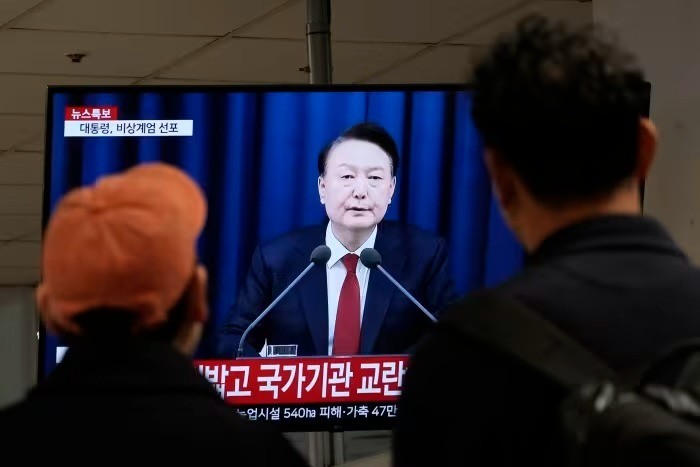
The military deployed special forces to the National Assembly, the election commission, and the office of a liberal YouTube commentator.
Yoon survived the first impeachment vote on Dec. 7 after apologizing to the public for causing “discomfort and anxiety” with his martial law decision. Most ruling party lawmakers boycotted the floor vote at the session.
But he was impeached a week later with some ruling party lawmakers joining the opposition bloc to oust him.
If Yoon is removed from office through a Constitutional Court trial, a new presidential election will be held within 60 days.
Write to In-Soo Nam at isnam@hankyung.com
Jennifer Nicholson-Breen edited this article.
More to Read
-
 Business & PoliticsKorea’s president impeached over martial law; political turmoil to ease
Business & PoliticsKorea’s president impeached over martial law; political turmoil to easeDec 14, 2024 (Gmt+09:00)
3 Min read -
 Business & PoliticsSouth Korea’s sovereign credit rating stable: S&P, Moody's, Fitch
Business & PoliticsSouth Korea’s sovereign credit rating stable: S&P, Moody's, FitchDec 13, 2024 (Gmt+09:00)
2 Min read -
 Business & PoliticsS.Korea's Yoon survives impeachment; economic fundamentals firm
Business & PoliticsS.Korea's Yoon survives impeachment; economic fundamentals firmDec 07, 2024 (Gmt+09:00)
4 Min read -
 Business & PoliticsSouth Korea’s president apologizes for martial law
Business & PoliticsSouth Korea’s president apologizes for martial lawDec 07, 2024 (Gmt+09:00)
1 Min read
Comment 0
LOG IN


